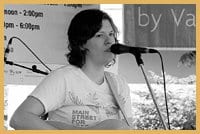Setup for the day, Jun 24, is an early morning whirlwind of tents, tables and the modest stage. By 11am, Grandview Park on Commerical Drive seems ready for the crowd already gathering in the heat. The calm is punctuated by uproar from Wold Cup fans in nearby cafés more interested in soccer than anything going on outside.
In the third year since its revival, the Stonewall Festival has been renamed; this year it’s called East Side Pride. Where the Stonewall Festival kept true to its roots-as a commemoration of the1969 Stonewall riots in New York that started the queer liberation movement in North America-East Side Pride has a new focus.
“The name change is taking ownership of the festival as East Side Pride and leaving Stonewall behind,” says Lee Casey, East Side Pride organizer and Festivals Director of the Vancouver Pride Society (VPS). “We wanted to make it a bit more about community identity and context.”
VPS chair John Boychuk also sounds off on the decision. “If you take a look at what Stonewall represents-a movement that really revolutionized the gay and lesbian movement towards social acceptance-it doesn’t say Vancouver, it doesn’t say Vancouver Pride. It doesn’t really say anything about what it represents to the younger generation. When you take a look at the younger generation, they don’t really know what Stonewall is.”
The name change seems welcome by festival goers who appreciate the local community on The Drive. Many simply walk or ride through the park on festival day, but those who have planned to set up for the day are prepared with blankets, sun block and sunglasses and have staked out the best spots on the grass in front of the stage. Attendance is up slightly from last year.
“I just moved back and it’s so much better,” says Kat Babcock, smiling. She has blue streaks in her hair and a matching blue balloon tied to her wrist. “I don’t feel so isolated and I feel like I belong. East Side Pride means celebrating where we live and the fact that it’s an area that’s really accepting of people. It’s not necessarily just for people that identify as gay.”
The sense of community in the neighbourhood beyond sexuality is very strong.
“We’ve lived in the neighbourhood for two years,” says Brian Dupuis, a 25-year resident of Vancouver. He’s sitting beside his partner, Paul DeRoche. “We bought a house here, and, within the first couple of days, all of our neighbours had come over, introduced themselves to us and brought us flowers and plants for the garden. We’re obviously a couple. People probably clued into that but it was a really positive thing.”
The eclectic nature of the performance lineup is indicative of the diversity of people at the festival today. A year ago, the Stonewall Festival was abuzz with talk of gay marriage; today, performances include sunny day rock, politically charged lyrics and poetry, tango and high camp humour.
The artists are quick to compare the feel of an East Side event to those in the West End.
“I’m glad this event is happening on the Drive,” says Edward Malaprop of the burlesque group Stilettos and Strap-ons. “Most pride events in the West End are really inaccessible for most of the queer woman community. This is a really cool move for the VPS to make.”
Taking time out from Aboriginal Week performances and events, Cris Derksen offers to festival goers layered, deep tones from her cello. “The difference is money,” she says plainly in comparing east and west. “There is a more holistic approach to community in the East Side.”
And money is on Boychuk’s mind, too. With a restructured board and the VPS fully recovered from a number of rocky fiscal years in the past, Boychuk notes a new emphasis on financial stability and sustainability for the organization.
“Looking back five years ago, the VPS was in a tight, tough, almost bankrupt scenario,” says Boychuk. “We’ve really looked at this as a business, but a business that has to focus on the community. We notice that there’s a real demand for grassroots community artisan events. We could have a big stage on Denman or Davie, but right now keeping East Side Pride as a true family festival is what people want.”
In contrast to East Side Pride is another VPS event, Homopalooza, set for Jul 30 at the Plaza of Nations.
Boychuk says it’s an event for the masses.
“Homopalooza is about the beer garden and big entertainment and the alternative sexposition,” he says.
Beyond the bigger events, Casey notes what he thinks really builds community in Vancouver. “We need to look beyond the bar culture,” he says. “Think about volunteering, joining square dancers, your local leather community and Vancouver Pride. I think Vancouverites need to do more and not be so passive in their attitudes. They need to embrace their community, embrace what they have and realize how lucky they are. See the forest for the trees. If I could offer anything to Vancouverites, that would be it.”

 Why you can trust Xtra
Why you can trust Xtra


